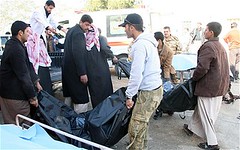
Bombing in Tikrit, the home of the martyred former Iraqi President Saddam Hussein, was the seen of a bomb attack against a recruiting station for security forces trained by the Pentagon. Attacks against U.S. troops and their allies are increasing.
Originally uploaded by Pan-African News Wire File Photos
By Liz Sly
Washington Post Foreign Service
Wednesday, January 19, 2011
BAGHDAD - A suicide bomber wearing an explosive vest killed at least 60 people lining up for jobs in the police force Tuesday in the northern city of Tikrit, underscoring the security challenges that confront Iraq's new government as it decides whether to ask for continued U.S. military assistance beyond 2011.
Iraqi police said hundreds of men had gathered in a yard near the police recruitment center when the man, wearing the vest under civilian clothes, mingled with those in the crowd and detonated himself.
Witnesses described scenes of mayhem as the bomb exploded, spraying nearby walls with blood and body parts. "It was like the eruption of a volcano, the fires of hell," said Omar Farouq al-Samarraie, 20, a job applicant whose legs, face and abdomen were severely burned in the midmorning attack.
Iraq's Interior Ministry put the death toll at 60, with as many as 150 people injured. Officials in Tikrit, Saddam Hussein's home town, said the toll had risen to 67 late in the evening after several injured victims died in hospitals swamped by the influx of casualties.
It was the deadliest single incident in Iraq since November and the first major attack since Prime Minister Nouri al-Maliki secured enough support to form his second government nearly a month ago.
With the government now in place after 10 months of political wrangling, Iraqi leaders are turning to the question of whether Iraq will need U.S. military help beyond the scheduled departure of U.S. troops at the end of the year, and if so, what form it should take.
On a visit to Baghdad last week, Vice President Biden and Maliki agreed on the need for a long-term "strategic partnership" between the two countries but did not discuss the possibility of a longer-term troop presence, U.S. and Iraqi officials say.
Maliki has repeatedly insisted that all 47,000 U.S. troops still in the country must leave by the deadline, and U.S. officials say they are committed to the terms of the security agreement under which they are required to go.
Tuesday's attack, however, called into question the ability of the Iraqi security forces to deter the kind of mass casualty suicide bombings that are generally blamed on the fading but still active organization al-Qaeda in Iraq.
Security force recruitment drives have long been a favored target of the extremist group, and this attack echoed one in central Baghdad in August, in which at least 60 men seeking jobs in the Iraqi army were blown up in similar circumstances. Tikriti officials said the authorities should have taken better precautions at the site.
"The security procedures weren't good. They did not meet the demands of such a gathering," said Col. Abdul Razzaq al-Jubouri of the Tikrit police.
Nonetheless, violence levels have been falling steadily since the summer, when the U.S. military officially ended its combat mission and transferred complete control of day-to-day security to the Iraqi army and police. December saw the lowest Iraqi casualty toll of 2010, with 151 civilians and members of the security forces killed, down from a peak of 426 in August, according to Iraqi government figures.
Although casualty figures were slightly higher in 2010 than 2009, according to the government's figures, the small increase was attributable to an increase in attacks on security forces, and civilian deaths were down.
But as the bombing in Tikrit demonstrated, groups such as al-Qaeda still have the capacity to mount devastating attacks, despite a dramatic weakening in recent years.
"What we've seen from the Iraqi security forces is a growing capacity to address internal threats from terrorist organizations," said a senior U.S. Embassy official, in a briefing to journalists conducted on the condition that he not be identified. "But also these terrorist organizations continue to be capable of mounting attacks on civilians, on the Iraqi security forces and on the international community."
A special correspondent in Tikrit contributed to this report.
No comments:
Post a Comment